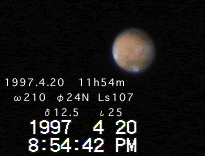
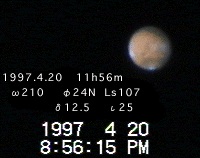
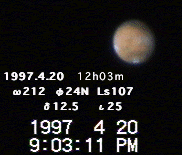
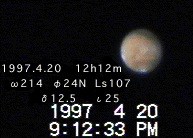
Doubled cloud patches on 20 April are most vividly seen on the images by Hg (processed from the Video images taken by Sony DV Camera VX 1000) taken around 11:55 GMT at LCM=210 degsW (12:03GMT at LCM=212 degsW, 12:12 GMT at LCM=214 degsW etc). We also have a moving image around 11:20GMT at LCM=202 degsW in which the following part of cloud is not yet clear, but Elysium is well misted and an overflow is seen to the south of the Aetheria dark patch. (According to the information recently received, Hg observed from 11:19 to 12:24GMT on the day.)
The print images at 11:55 GMT LCM=210 degsW are made of red and blue images in addition to the integrated colour image; and the blue one most clearly shows the doubled cloud, and hence it must have been a series of white clouds. The season on 20 Apr was 107 degsLs, the apparent diameter was 12.5", and the phase angle was 25 degs.
Hg also took pictures on 19 Apr and 21 Apr. The image on 19 Apr at LCM =225 degsW shows the afternoon Elysium to be light but any protrusion of the cloud westwards is not so evident while the morning terminator is misted (maybe over Syrtis Mj). Recently Hg informed us that he continuously shot from 12:46 to 13:21GMT and sent us a processed print at 12:48GMT LCM=232 degsW where a long tail of cloud from Elysium to the morning limb is visible in blue (but less in green).
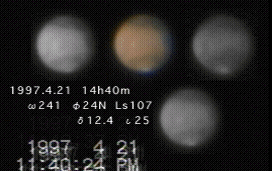
The images by Hg on 21 Apr were first sent us by
moving ones as reported in #190 p2084 which were taken at
1) 11:40GMT LCM=193 degsW,
2) LCM=202 degsW,
3) LCM=212 degsW,
4) LCM=222 degsW,
5) LCM=232 degsW and
6) 14:40GMT LCM=241 degsW.
In 1), Elysium is still near the morning terminator. Image
2) is poor.
3) shows the same angle as the one on 20 Apr when the cloud was conspicuous,
but here it is not so vivid, looking dispersed. Elysium is well whitish light.
(Seeing was however 5/10 on 21 Apr while 7~8/10 on 19 and 20 Apr).
Image 4) shows two patches of the clouds though the following part is weaker.
In 5) no more than Elysiums light (Cebrenia visible). The same in 6).
Afterwards we received from Hg processed
prints of some of the 21 Apr images: the cloud patches really prove to be
weaker in all.
As reported in #190, Tomio AKUTSU (Ak) took CCD images on 19 Apr at a) LCM=213 degsW and on 22 Apr at b) LCM=183 degsW, at c) LCM=202 degsW, at d) LCM=218 degsW, at e) LCM=236 degsW ( in #190 p2082 the Red images were counted, but here images in B light are picked out). Image a) shows vaguely the two patches, and in c) and d) we can also see weakly the cloud, but these images are not comparable with those by Hg.
Visually Hiroshi ISHADOH (Id) observed on 19, 20 and 21 Apr: He detected the morning mist large on 19 Apr at LCM=223 degsW. Id's observations on 20 Apr are somewhat late (ie at LCM=240 degsW and 250 degsW). On 21 Apr at LCM= 212 degsW and at LCM=222 degsW, the morning mist remains to be large but not connected with Elysium (Id's light Elysium is concentrated around Elysium Mons).
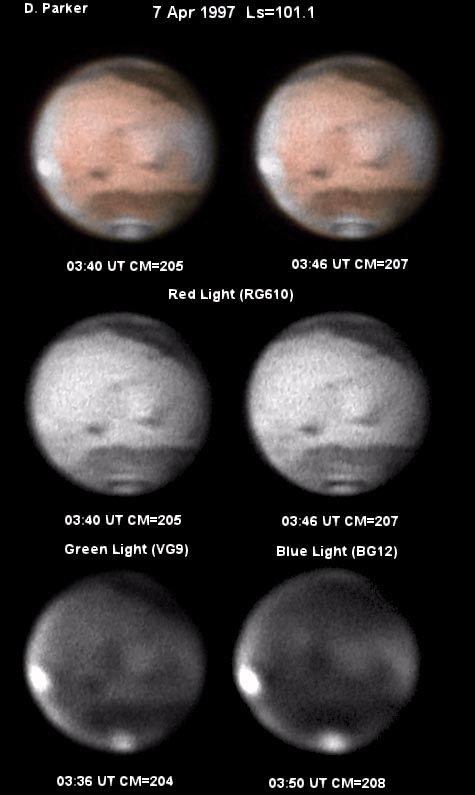 The present writer (Mn)'s observations on 19 Apr qualitatively show
that at LCM=220 degsW a morning mist preceding Syrtis Mj was present
independent of Elysium (so very the same as Id's observation), but that at
LCM=240 degsW, the following cloud was not obvious. On 20 Apr NAKAJIMA (Nj)
and Mn observed at 1) LCM=189 degsW(Mn)/194 degsW(Nj) that the area from the
morning terminator to Elysium was already covered by a large morning mist,
at 2) LCM=199 degsW/204 degsW, the morning mist was still large, at 3) LCM=
209 degsW/214 degsW, the morning cloud hung over Elysium, at 4) LCM=219 degsW,
the cloud looked made of two patches; divided by the presence of the
Aetheria dark patch, and at 5) LCM=228 degsW, no longer the following patch
was visible, though the morning mist preceding Syrtis Mj was present.
Observed up to LCM=248 degsW. The observations complement those by Hg on 20
Apr, though the comparison is not simple.
The present writer (Mn)'s observations on 19 Apr qualitatively show
that at LCM=220 degsW a morning mist preceding Syrtis Mj was present
independent of Elysium (so very the same as Id's observation), but that at
LCM=240 degsW, the following cloud was not obvious. On 20 Apr NAKAJIMA (Nj)
and Mn observed at 1) LCM=189 degsW(Mn)/194 degsW(Nj) that the area from the
morning terminator to Elysium was already covered by a large morning mist,
at 2) LCM=199 degsW/204 degsW, the morning mist was still large, at 3) LCM=
209 degsW/214 degsW, the morning cloud hung over Elysium, at 4) LCM=219 degsW,
the cloud looked made of two patches; divided by the presence of the
Aetheria dark patch, and at 5) LCM=228 degsW, no longer the following patch
was visible, though the morning mist preceding Syrtis Mj was present.
Observed up to LCM=248 degsW. The observations complement those by Hg on 20
Apr, though the comparison is not simple.
The MarsWatch Web-site shows the CCD images by Don PARKER (DPk) on 7 Apr (101 degsLs) at LCM=208 degsW where Elysium is light and the area near the morning terminator is misted. On the other hand at the end of May from Japan, a similar aspect was observed. For example, the present writer (Mn)'s observations on 28 May (125 degsLs) depict a similar aspect at LCM=190 degsW, LCM=200 degsW, LCM=210 degsW, LCM=219 degsW, LCM=229 degsW, LCM=239 degsW etc. The records in 1995 also show that a similar phenomenon was observed on 31 Apr 1995 (078 degsLs) at LCM=215 degsW and on 4 Apr 1995 (080 degsLs) at LCM= 217 degsW (when the apparent diameter=10.1").
Accordingly, we may consider
that the phenomenon must have lasted during a longer period, but at present
no other neighbouring observations are obtained. (MarsWatch web-site pages
are insufficient in this sense.) As far as we check our observations as
stated above, we are thus inclined to favour the conclusion that the cloud
activity over the morning area over Elysium to Libya was very conspicuous
around 20 Apr (107 degsLs).